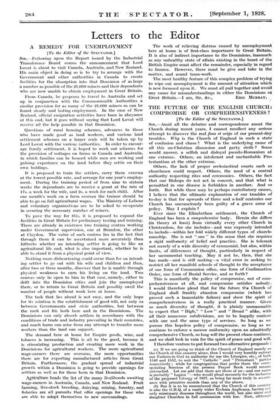Letters to the Editor
A REMEDY FOR UNEMPLOYMENT [To the Editor of the SPECTATOR.] SIR,—Following upon the Report issued by the Industrial Transference Board comes the announcement that Lord Lovat is about to visit Canada, Australia, and New Zealand. His main object in doing so is to try to arrange with the Government and other authorities in Canada to create facilities for the absorption into that Dominion of as large a number as possible of the 21,000 miners and their dependants who are now unable to obtain employment in Great Britain.
From Canada, he proposes to travel to Australia and set up in conjunction with the Commonwealth Authorities a similar provision for as many of the 21,000 miners as can be found steady and lasting employment. In the case of New Zealand, official emigration activities have been in abeyance at this end, but it goes without saying that Lord Lovat will receive all the help possible in that Dominion.
Questions of rural housing schemes, advances to those who have made good as land workers, and various land settlement schemes on a larger scale will be taken up by Lord Lovat with the various authorities. In order to encour- age family settlement, it Is hoped to work out schemes for the provision of cottages on farms in Canada and Australia, in which families can be housed while men are working and gaining experience on the land before they settle on their own holdings.
It is proposed to train the settlers, carry them oversew at the lowest possible rate, and arrange for one year's employ- ment. During the training period of from nine to sixteen weeks the dependants are to receive a grant at the rate of 17s. a week for the wife, and 2s. a week for each child. After one month's work on a farm oversee the trainee should be able to go on full agricultural wages. The Ministry of Labour and voluntary organizations are to be asked to co-operate in securing the necessary number of miners.
To pave the way for this, it is proposed to expand the facilities in Great Britain for preliminary testing and training. There are already in existence two training centres working under Government supervision, one at Brandon, the other at Claydon. The value of such centres lies in the fact that through them it can be ascertained more accurately than hitherto whether an intending settler is going to like an agricultural life and, what is also important, whether he is able to stand it from a physical point of view.
Nothing more disheartening could occur than for an intend- ing settler to go out with his wife and children and then, after two or three months, discover that he is unable through physical weakness to earn his living on the land. Two courses only lie open to him in that case, namely, either to drift into the Dominion cities and join the unemployed there, or to return to Great Britain and possibly swell the number of people without work here at home.
The task that lies ahead is not easy, and the only hope for its solution is the establishment of good will, not only as between Governments and civic authorities, but between the rank and file both here and in the Dominions. The Dominions can only absorb settlers in accordance with the conditions of trade and industry prevailing in their countries, and much harm can arise from any attempt to transfer more workers than the land can support.
The demand here at home for Empire goods, wine, and tobacco is increasing. This is all to the good, because it is stimulating production and creating more work in the Dominions for agricultural workers. The more agricultural wage-earners there are overseas, the more opportunities there are for exporting manufactured articles from Great Britain. Furthermore, the gradual spread of industrial growth within a Dominion is going to provide openings for settlers as well as for those born in that Dominion.
Agriculture heads the list of the many livelihoods awaiting wage-earners in Australia, Canada, and New Zealand. Fruit farming, live-stock breeding, dairying, mining, forestry, and fisheries are all pursuits that offer openings for those who are able to adapt themselves to new surroundings.
The work of relieving distress caused by unemployment here at home is of first-class importande to Great Britain. It is also of indirect importance to the Dominions, inasmuch as any unhealthy state of affairs existing in the heart of the British Empire must affect the remainder, especially in regard to finance. However, there must be give and take in the matter, and sound team-work.
The most healthy feature of this complex problem of trying to wipe out unemployment is the amount of attention which is now focussed upon it. We must all pull together and avoid any cause for misunderstandings in either the Dominions or Great Britain.—I am, Sir, &c., ERIC MURRAY.






























 Previous page
Previous page